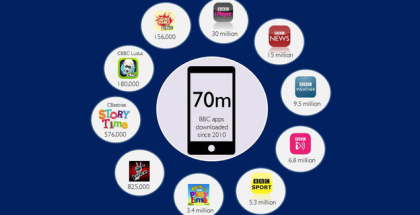BBC and Channel 4 competing for young viewers?
David Farnor | On 11, Jun 2014
The BBC and Channel 4 have both lost more young viewers than other broadcasts, according to stats from Broadcasts’ Audience Research Board.
The figures, published in The I Newspaper, show that the Beeb and Channel 4 have both lost 12 per cent of viewers aged between 25 and 34 between 2010 to 2013, higher than the 7 per cent loss recorded by other broadcasters.
The figures, though, do not take into account viewers who use tablets or mobile devices.
Mobile devices are an increasingly major driver of viewing traffic for the BBC, with tablets overtaking desktops for the first time in May. Tablets made up 30 per cent of traffic on BBC iPlayer, compared to 28 per cent of users who used computers.
In April, 40 per cent of BBC iPlayer’s viewing requests came from users aged between 25 and 34,
A statement from the BBC said: “The BBC is committed to all audiences and while across our portfolio we have the highest share of young viewers – and iPlayer is the UK’s leading on-demand service – we are working hard to ensure we keep innovating in this area.”
While ITV saw its share of 25 to 34 year olds dip 3 per cent across the same three-year period, Channel 4 lost 19 per cent of its audience aged between 16 to 24, say the Barb figures.
The company’s own figures at the start of this year also showed a surge in on-demand traffic: 10 million viewers are registered with Channel 4, making up half of all UK viewers between 16 and 24.
A spokesperson for the broadcaster told the BBC: “Over 2014 our share of young 16-34 viewers is up 1 per cent year-on-year – with our young-skewing channel E4 enjoying a record start to the year, up 5 per cent.”
The individual broadcast data suggests that while younger viewers are turning off their TVs, they are increasingly turning on their tablets or mobile devices. Indeed, far from losing the youth audience, it appears that the rival broadcasters are, in fact, competing for them: traffic to 4oD was up 20 per cent in the first quarter of 2014 year-on-year, while BBC iPlayer has seen traffic climb 4 per cent annually for the past two months.
Barb is reportedly developing a new system to monitor mobile and tablet viewing alongside traditional methods. What their latest figures show, then, is not that the BBC and Channel 4 are losing their touch, but that the industry’s own metrics need updating. Viewing behaviour has significantly shifted in Britain: the statistics need to change with it.


















